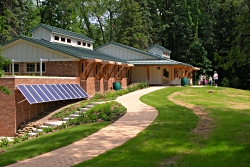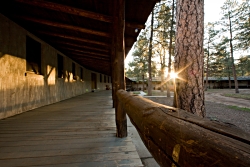Greetings from Clivus Multrum!
In this issue, we discuss two stories about how Clivus Multrum is helping customers achieve sustainability. In Akron, Metro Parks, Serving Summit County are learning LEED on their way to the first Platinum building in Ohio. In Beulah, CO the Mountain Park Environmental Center is breathing new life into a 1930s WPA lodge without putting a burden on local water supplies.
First to the Summit in Ohio
 |
| The new Ranger and Resource Management Office at Sand Run in Akron, OH. |
Metro Parks, Serving Summit County, a long time user of Clivus Multrum systems, manages 9,405 acres in 13 developed parks and 6 conservation areas. Four million visitors use their trails and parks every year. In the early 1980s, Metro Parks installed their first Clivus Multrum systems, and today they have more than a dozen spread across 7 parks. Metro Parks’ most recent project is their first experience with Clivus in an office building and their first experience with LEED certification.
(In the interest of full disclosure, we note that MPSSC once tried a composting toilet system from one of Clivus Multrum’s competitors. The company--which shall remain nameless--manufactures composters with a crank mechanism to mix waste with bulking material. After the crank broke, Metro Parks returned to Clivus Multrum, which Dave Whited, Chief of planning and development for Metro Parks, refers to as “the Cadillac of the Industry.”)
The LEED process was new to everyone involved in the recently completed Ranger and Resource Management Building so it was decided that every effort would be made to use the experience as a learning and teaching opportunity. Local planners and facility managers were invited to weekly meetings so that they could learn from observation. Potential contractors were required to attend a LEED workshop before bidding on the job. Lead architect, Joe Matava, of Peninsula Architects, originally expected LEED to be daunting. But, to his surprise, he found that the integrated design process that brought together the various contractors and engineers with regular meetings made the process go smoothly.
| The Foam-flush toilets use just 6 ounces of water per use, which is just 3% of the water used by a standard 1.6 gallon flush toilet. |
The new administration space has an open layout with 10-15 work stations that serve rangers, scientists, interns and seasonal workers. The building, which has been converted from a private home, also includes a kitchen, library area, locker rooms and a meeting space that can accommodate 30 people. The medium-sized commercial Clivus unit serving the building includes two Foam-flush toilets and a waterless urinal. The Foam-flush toilets use just 6 ounces of water per use, which is just 3% of the water used by a standard 1.6 gallon flush toilet. The system is rated to 22,500 visits annually which results in a potential savings of 36,000 gallons of water annually. Clivus worked with Matava, the architect and Paul Wilkerson, the engineer to determine the appropriate sizing for the compost system as well as to make sure it would work within the retro-fit of the structure.
A variety of other green building features helps contribute toward LEED Platinum certification. Rain water harvesting combined with a rain garden, a green roof, and porous pavers help prevent runoff. Two types of solar panels help run the high efficiency electrical devices in the building. Motion and sound sensors as well as geothermal heat contribute to significant energy savings. Local and reclaimed wood were used throughout and the original cherry floorboards were turned into cabinetry. Furniture, carpeting and many building materials are either recycled or recyclable.
The new Ranger and Resource Management Office opened this spring. Like all the Clivus systems owned by Metro Parks, this one is being maintained by Parks staff. Metro Parks’ decision to go with Clivus for this project is both a reaffirmation of confidence in a technology they’ve used for over twenty years and a demonstration of a commitment to environmental sustainability.
Conservation in Colorado
 |
| Sunrise breaks through the trees at the Horshoe Lodge in Beulah, CO. Composting toilets helped MPEC expand and save water. |
Fact: In 2002 the town of Beulah, CO ran out of water. All summer water for the town’s residents had to be trucked in.
This year, the Mountain Park Environmental Center in Beulah began renovating a 1930s lodge into an educational retreat center. For Center Director Dave Van Manen the recent extreme water shortage in the area called out for compost toilets in the renovation as both a way to save a resource and teach students and guests that there’s a more sensible method of dealing with human waste than using a huge amount of water to move it.
The drought that affected the entire nation in 2002, dried up the streams that provide Beulah’s water supply and plunged the town into a state of emergency. Eight consecutive months of below average precipitation made for the driest year on Colorado’s 108 year record. Local officials did not have the funds to haul the more than seventy thousand gallons of water that residents used in a typical day. Pueblo County officials authorized emergency water shipments, providing only 10 gallons a day per person. Though recent years have not seen such extreme dry weather, water problems remain on the minds of local residents. Van Manen had the 2002 drought very much in mind when planning the renovation: “The only way we’re really going to pull this off is to use the minimum amount of water possible,” he said.
The Center, which operates within Pueblo Mountain Park, had used a Park building for its environmental workshops and lectures. As demand for additional programs and activities grew, plans evolved to renovate a 1930’s Work Progress Administration building in the park. Phase I of the Horseshoe Lodge renovation is complete and includes classrooms, offices, kitchen and dining areas.
| Van Manen had the 2002 drought very much in mind when planning the renovation: “The only way we’re really going to pull this off is to use the minimum amount of water possible,” he said. |
Several options were considered for water saving toilets and it was determined that Clivus Multrum composting toilets were the best choice for a maximum water reduction. Two medium-sized composters with four Foam-flush toilets and a waterless urinal provide capacity for 90,000 uses a year. Clivus’ Foam-flush toilets use only 6 ounces of water per use. When compared to conventional low-flow 1.6gpf toilets that is a 98% savings and 70,000 gallons of water saved each year.
Clivus Multrum composting toilets were partially funded by a Supplemental Environmental Project grant from the State of Colorado. SEP grants are funded by the fines levied on violators of environmental laws and awarded to projects focused on conservation and environmental protection. Other funding for the renovations at Horseshoe Lodge came from mostly small donations from community members with a few large matching donations from private organizations. Several other states have SEP programs. Check with yours to see if grant opportunities are available.
MPEC celebrated the completion of the first phase of renovation with a grand opening in October. Phases II and III are to follow and include dormitory and bed and breakfast style lodgings with more composting toilets to accommodate guests for retreats and other overnight programming. Van Manen is looking forward to the full occupancy of the Lodge and the beginning of the water conserving capabilities of his new Clivus systems. If Beulah ever finds itself in a situation like that of 2002, it won’t be because MPEC didn’t do all it could to conserve water. |
